APES 110: Ethics in Accounting
VerifiedAdded on 2019/10/30
|6
|1895
|438
Essay
AI Summary
This essay examines the role of APES 110 (Accounting Professional and Ethical Standards Board Standard 110) in promoting ethical conduct within the Australian accounting profession. It argues that ethical behavior is crucial for maintaining public trust, a vital element for the profession's continued relevance. The essay explores the concept of virtue ethics in accounting, highlighting virtues like courage, wisdom, justice, and self-mastery. It then analyzes how APES 110 addresses these virtues through its sections on objectivity (120), professional competence and due care (130), professional behavior (150), and integrity (110). The essay further discusses how APES 110 addresses threats to auditor independence, including conflicts of interest and the importance of both actual and perceived independence. It highlights the code's guidance on various situations that could lead to ethical dilemmas, emphasizing the safeguards and mechanisms for maintaining ethical conduct. Finally, the essay concludes that APES 110 serves as a valuable tool for improving ethical conduct and fostering public trust in the accounting profession by providing clear guidelines, addressing threats to independence, and offering practical safeguards.
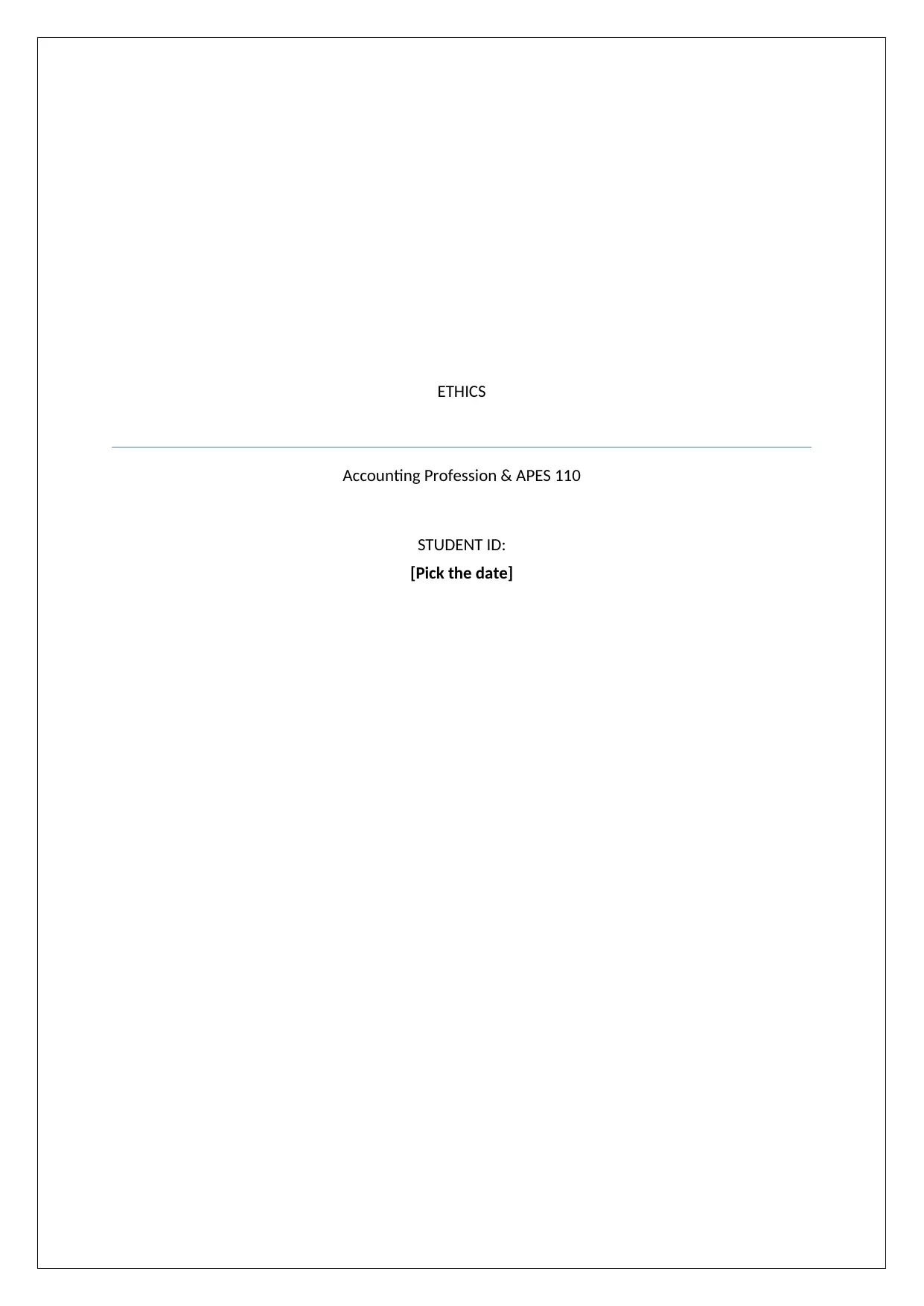
ETHICS
Accounting Profession & APES 110
STUDENT ID:
[Pick the date]
Accounting Profession & APES 110
STUDENT ID:
[Pick the date]
Paraphrase This Document
Need a fresh take? Get an instant paraphrase of this document with our AI Paraphraser
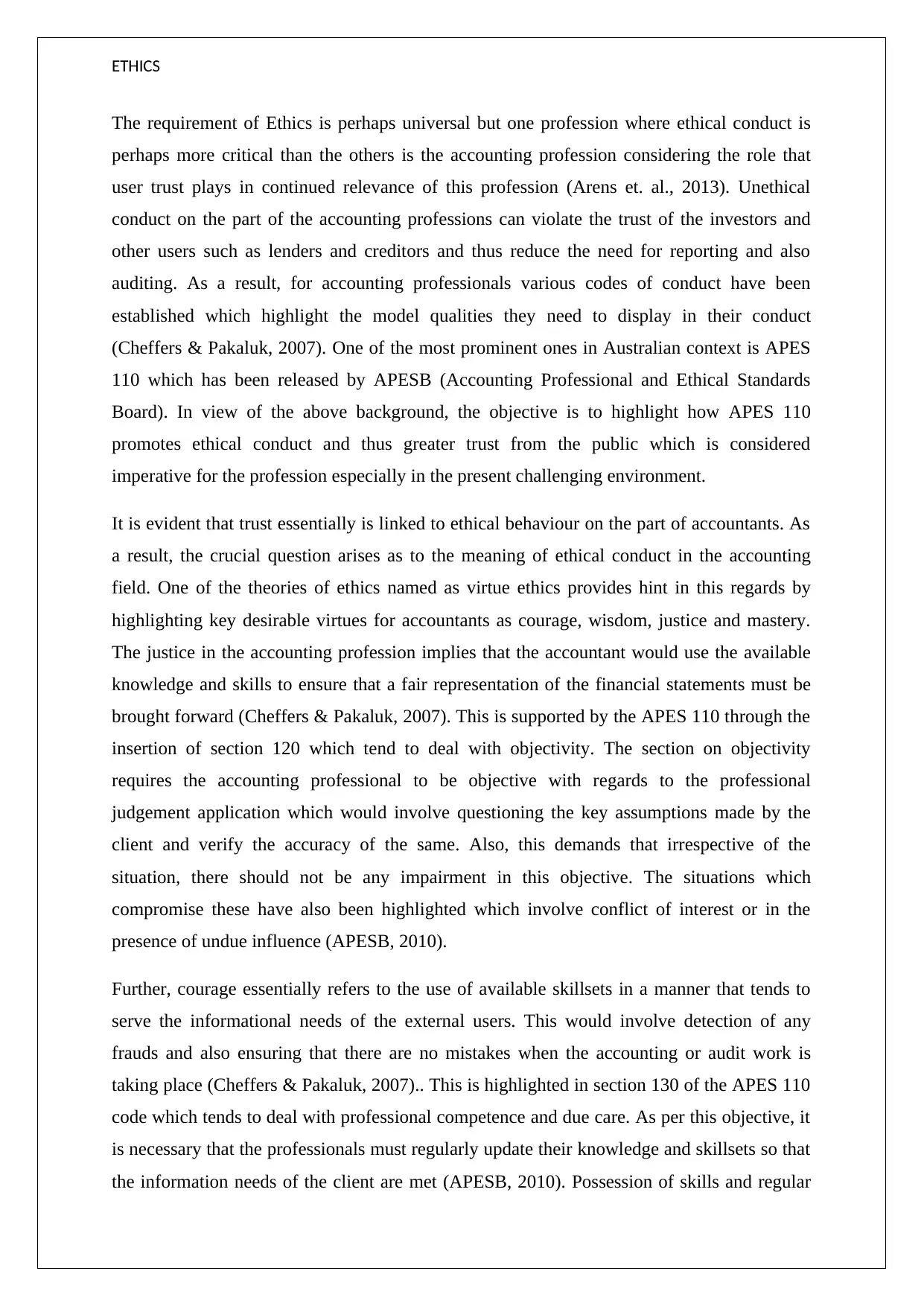
ETHICS
The requirement of Ethics is perhaps universal but one profession where ethical conduct is
perhaps more critical than the others is the accounting profession considering the role that
user trust plays in continued relevance of this profession (Arens et. al., 2013). Unethical
conduct on the part of the accounting professions can violate the trust of the investors and
other users such as lenders and creditors and thus reduce the need for reporting and also
auditing. As a result, for accounting professionals various codes of conduct have been
established which highlight the model qualities they need to display in their conduct
(Cheffers & Pakaluk, 2007). One of the most prominent ones in Australian context is APES
110 which has been released by APESB (Accounting Professional and Ethical Standards
Board). In view of the above background, the objective is to highlight how APES 110
promotes ethical conduct and thus greater trust from the public which is considered
imperative for the profession especially in the present challenging environment.
It is evident that trust essentially is linked to ethical behaviour on the part of accountants. As
a result, the crucial question arises as to the meaning of ethical conduct in the accounting
field. One of the theories of ethics named as virtue ethics provides hint in this regards by
highlighting key desirable virtues for accountants as courage, wisdom, justice and mastery.
The justice in the accounting profession implies that the accountant would use the available
knowledge and skills to ensure that a fair representation of the financial statements must be
brought forward (Cheffers & Pakaluk, 2007). This is supported by the APES 110 through the
insertion of section 120 which tend to deal with objectivity. The section on objectivity
requires the accounting professional to be objective with regards to the professional
judgement application which would involve questioning the key assumptions made by the
client and verify the accuracy of the same. Also, this demands that irrespective of the
situation, there should not be any impairment in this objective. The situations which
compromise these have also been highlighted which involve conflict of interest or in the
presence of undue influence (APESB, 2010).
Further, courage essentially refers to the use of available skillsets in a manner that tends to
serve the informational needs of the external users. This would involve detection of any
frauds and also ensuring that there are no mistakes when the accounting or audit work is
taking place (Cheffers & Pakaluk, 2007).. This is highlighted in section 130 of the APES 110
code which tends to deal with professional competence and due care. As per this objective, it
is necessary that the professionals must regularly update their knowledge and skillsets so that
the information needs of the client are met (APESB, 2010). Possession of skills and regular
The requirement of Ethics is perhaps universal but one profession where ethical conduct is
perhaps more critical than the others is the accounting profession considering the role that
user trust plays in continued relevance of this profession (Arens et. al., 2013). Unethical
conduct on the part of the accounting professions can violate the trust of the investors and
other users such as lenders and creditors and thus reduce the need for reporting and also
auditing. As a result, for accounting professionals various codes of conduct have been
established which highlight the model qualities they need to display in their conduct
(Cheffers & Pakaluk, 2007). One of the most prominent ones in Australian context is APES
110 which has been released by APESB (Accounting Professional and Ethical Standards
Board). In view of the above background, the objective is to highlight how APES 110
promotes ethical conduct and thus greater trust from the public which is considered
imperative for the profession especially in the present challenging environment.
It is evident that trust essentially is linked to ethical behaviour on the part of accountants. As
a result, the crucial question arises as to the meaning of ethical conduct in the accounting
field. One of the theories of ethics named as virtue ethics provides hint in this regards by
highlighting key desirable virtues for accountants as courage, wisdom, justice and mastery.
The justice in the accounting profession implies that the accountant would use the available
knowledge and skills to ensure that a fair representation of the financial statements must be
brought forward (Cheffers & Pakaluk, 2007). This is supported by the APES 110 through the
insertion of section 120 which tend to deal with objectivity. The section on objectivity
requires the accounting professional to be objective with regards to the professional
judgement application which would involve questioning the key assumptions made by the
client and verify the accuracy of the same. Also, this demands that irrespective of the
situation, there should not be any impairment in this objective. The situations which
compromise these have also been highlighted which involve conflict of interest or in the
presence of undue influence (APESB, 2010).
Further, courage essentially refers to the use of available skillsets in a manner that tends to
serve the informational needs of the external users. This would involve detection of any
frauds and also ensuring that there are no mistakes when the accounting or audit work is
taking place (Cheffers & Pakaluk, 2007).. This is highlighted in section 130 of the APES 110
code which tends to deal with professional competence and due care. As per this objective, it
is necessary that the professionals must regularly update their knowledge and skillsets so that
the information needs of the client are met (APESB, 2010). Possession of skills and regular
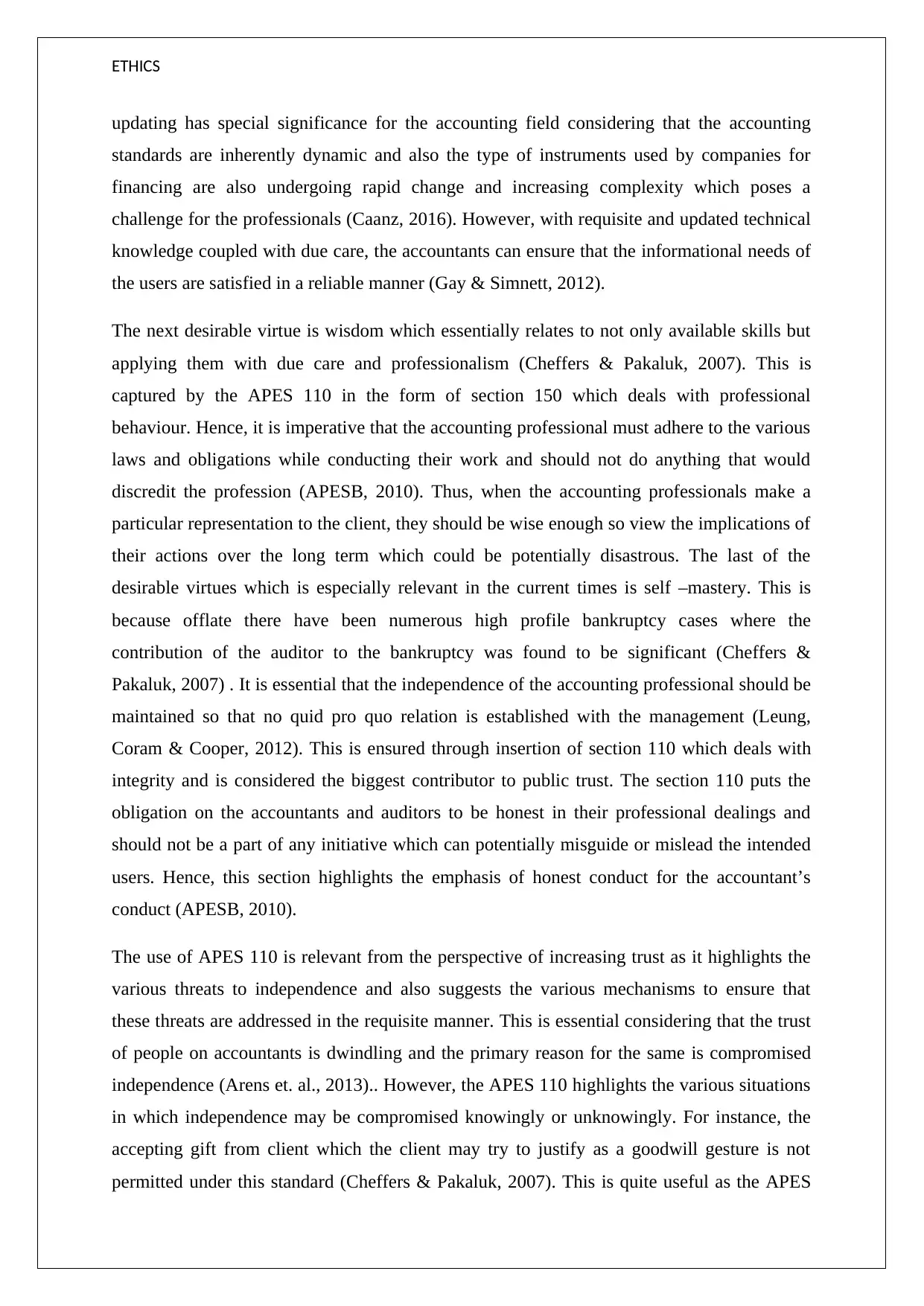
ETHICS
updating has special significance for the accounting field considering that the accounting
standards are inherently dynamic and also the type of instruments used by companies for
financing are also undergoing rapid change and increasing complexity which poses a
challenge for the professionals (Caanz, 2016). However, with requisite and updated technical
knowledge coupled with due care, the accountants can ensure that the informational needs of
the users are satisfied in a reliable manner (Gay & Simnett, 2012).
The next desirable virtue is wisdom which essentially relates to not only available skills but
applying them with due care and professionalism (Cheffers & Pakaluk, 2007). This is
captured by the APES 110 in the form of section 150 which deals with professional
behaviour. Hence, it is imperative that the accounting professional must adhere to the various
laws and obligations while conducting their work and should not do anything that would
discredit the profession (APESB, 2010). Thus, when the accounting professionals make a
particular representation to the client, they should be wise enough so view the implications of
their actions over the long term which could be potentially disastrous. The last of the
desirable virtues which is especially relevant in the current times is self –mastery. This is
because offlate there have been numerous high profile bankruptcy cases where the
contribution of the auditor to the bankruptcy was found to be significant (Cheffers &
Pakaluk, 2007) . It is essential that the independence of the accounting professional should be
maintained so that no quid pro quo relation is established with the management (Leung,
Coram & Cooper, 2012). This is ensured through insertion of section 110 which deals with
integrity and is considered the biggest contributor to public trust. The section 110 puts the
obligation on the accountants and auditors to be honest in their professional dealings and
should not be a part of any initiative which can potentially misguide or mislead the intended
users. Hence, this section highlights the emphasis of honest conduct for the accountant’s
conduct (APESB, 2010).
The use of APES 110 is relevant from the perspective of increasing trust as it highlights the
various threats to independence and also suggests the various mechanisms to ensure that
these threats are addressed in the requisite manner. This is essential considering that the trust
of people on accountants is dwindling and the primary reason for the same is compromised
independence (Arens et. al., 2013).. However, the APES 110 highlights the various situations
in which independence may be compromised knowingly or unknowingly. For instance, the
accepting gift from client which the client may try to justify as a goodwill gesture is not
permitted under this standard (Cheffers & Pakaluk, 2007). This is quite useful as the APES
updating has special significance for the accounting field considering that the accounting
standards are inherently dynamic and also the type of instruments used by companies for
financing are also undergoing rapid change and increasing complexity which poses a
challenge for the professionals (Caanz, 2016). However, with requisite and updated technical
knowledge coupled with due care, the accountants can ensure that the informational needs of
the users are satisfied in a reliable manner (Gay & Simnett, 2012).
The next desirable virtue is wisdom which essentially relates to not only available skills but
applying them with due care and professionalism (Cheffers & Pakaluk, 2007). This is
captured by the APES 110 in the form of section 150 which deals with professional
behaviour. Hence, it is imperative that the accounting professional must adhere to the various
laws and obligations while conducting their work and should not do anything that would
discredit the profession (APESB, 2010). Thus, when the accounting professionals make a
particular representation to the client, they should be wise enough so view the implications of
their actions over the long term which could be potentially disastrous. The last of the
desirable virtues which is especially relevant in the current times is self –mastery. This is
because offlate there have been numerous high profile bankruptcy cases where the
contribution of the auditor to the bankruptcy was found to be significant (Cheffers &
Pakaluk, 2007) . It is essential that the independence of the accounting professional should be
maintained so that no quid pro quo relation is established with the management (Leung,
Coram & Cooper, 2012). This is ensured through insertion of section 110 which deals with
integrity and is considered the biggest contributor to public trust. The section 110 puts the
obligation on the accountants and auditors to be honest in their professional dealings and
should not be a part of any initiative which can potentially misguide or mislead the intended
users. Hence, this section highlights the emphasis of honest conduct for the accountant’s
conduct (APESB, 2010).
The use of APES 110 is relevant from the perspective of increasing trust as it highlights the
various threats to independence and also suggests the various mechanisms to ensure that
these threats are addressed in the requisite manner. This is essential considering that the trust
of people on accountants is dwindling and the primary reason for the same is compromised
independence (Arens et. al., 2013).. However, the APES 110 highlights the various situations
in which independence may be compromised knowingly or unknowingly. For instance, the
accepting gift from client which the client may try to justify as a goodwill gesture is not
permitted under this standard (Cheffers & Pakaluk, 2007). This is quite useful as the APES
⊘ This is a preview!⊘
Do you want full access?
Subscribe today to unlock all pages.

Trusted by 1+ million students worldwide
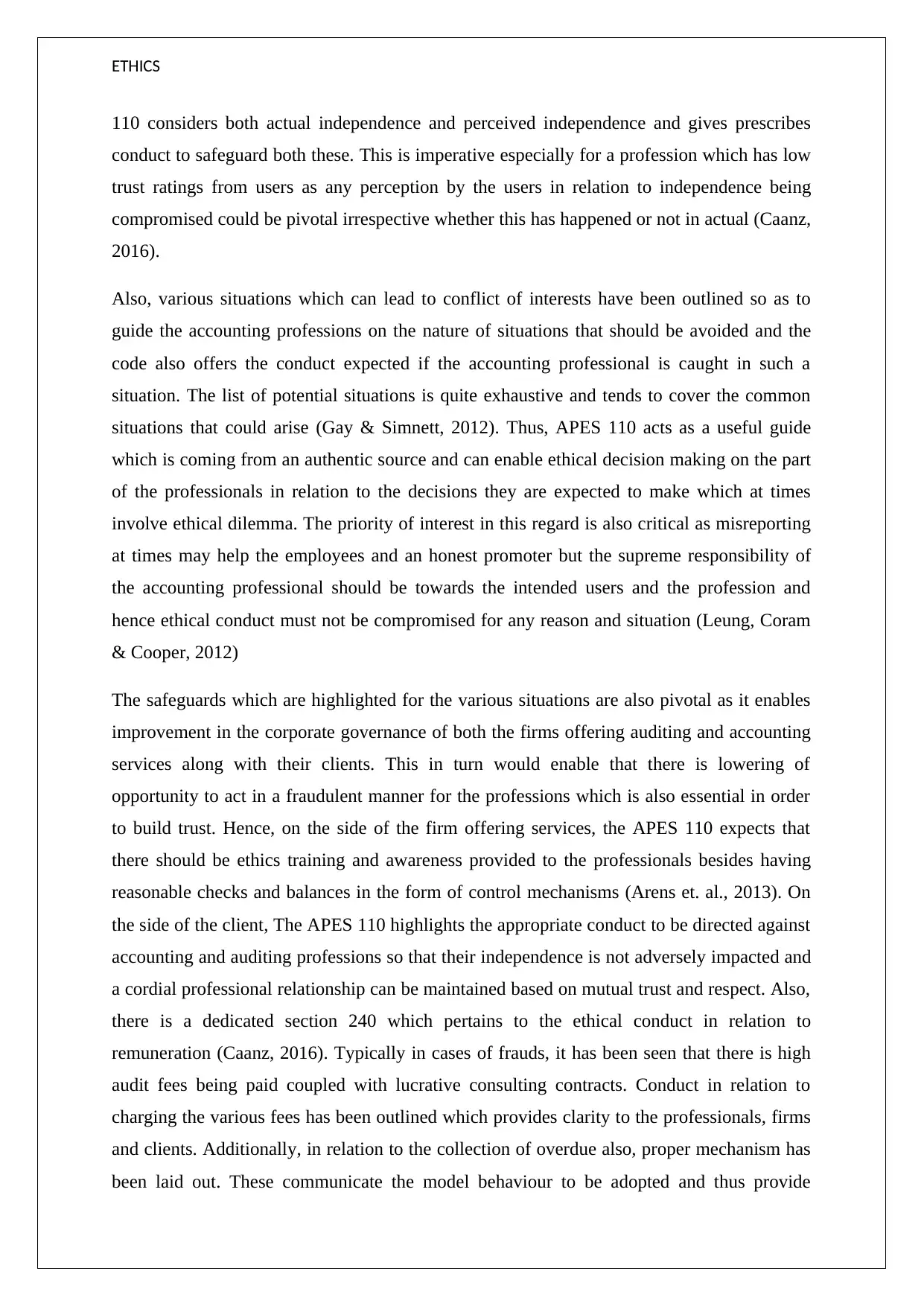
ETHICS
110 considers both actual independence and perceived independence and gives prescribes
conduct to safeguard both these. This is imperative especially for a profession which has low
trust ratings from users as any perception by the users in relation to independence being
compromised could be pivotal irrespective whether this has happened or not in actual (Caanz,
2016).
Also, various situations which can lead to conflict of interests have been outlined so as to
guide the accounting professions on the nature of situations that should be avoided and the
code also offers the conduct expected if the accounting professional is caught in such a
situation. The list of potential situations is quite exhaustive and tends to cover the common
situations that could arise (Gay & Simnett, 2012). Thus, APES 110 acts as a useful guide
which is coming from an authentic source and can enable ethical decision making on the part
of the professionals in relation to the decisions they are expected to make which at times
involve ethical dilemma. The priority of interest in this regard is also critical as misreporting
at times may help the employees and an honest promoter but the supreme responsibility of
the accounting professional should be towards the intended users and the profession and
hence ethical conduct must not be compromised for any reason and situation (Leung, Coram
& Cooper, 2012)
The safeguards which are highlighted for the various situations are also pivotal as it enables
improvement in the corporate governance of both the firms offering auditing and accounting
services along with their clients. This in turn would enable that there is lowering of
opportunity to act in a fraudulent manner for the professions which is also essential in order
to build trust. Hence, on the side of the firm offering services, the APES 110 expects that
there should be ethics training and awareness provided to the professionals besides having
reasonable checks and balances in the form of control mechanisms (Arens et. al., 2013). On
the side of the client, The APES 110 highlights the appropriate conduct to be directed against
accounting and auditing professions so that their independence is not adversely impacted and
a cordial professional relationship can be maintained based on mutual trust and respect. Also,
there is a dedicated section 240 which pertains to the ethical conduct in relation to
remuneration (Caanz, 2016). Typically in cases of frauds, it has been seen that there is high
audit fees being paid coupled with lucrative consulting contracts. Conduct in relation to
charging the various fees has been outlined which provides clarity to the professionals, firms
and clients. Additionally, in relation to the collection of overdue also, proper mechanism has
been laid out. These communicate the model behaviour to be adopted and thus provide
110 considers both actual independence and perceived independence and gives prescribes
conduct to safeguard both these. This is imperative especially for a profession which has low
trust ratings from users as any perception by the users in relation to independence being
compromised could be pivotal irrespective whether this has happened or not in actual (Caanz,
2016).
Also, various situations which can lead to conflict of interests have been outlined so as to
guide the accounting professions on the nature of situations that should be avoided and the
code also offers the conduct expected if the accounting professional is caught in such a
situation. The list of potential situations is quite exhaustive and tends to cover the common
situations that could arise (Gay & Simnett, 2012). Thus, APES 110 acts as a useful guide
which is coming from an authentic source and can enable ethical decision making on the part
of the professionals in relation to the decisions they are expected to make which at times
involve ethical dilemma. The priority of interest in this regard is also critical as misreporting
at times may help the employees and an honest promoter but the supreme responsibility of
the accounting professional should be towards the intended users and the profession and
hence ethical conduct must not be compromised for any reason and situation (Leung, Coram
& Cooper, 2012)
The safeguards which are highlighted for the various situations are also pivotal as it enables
improvement in the corporate governance of both the firms offering auditing and accounting
services along with their clients. This in turn would enable that there is lowering of
opportunity to act in a fraudulent manner for the professions which is also essential in order
to build trust. Hence, on the side of the firm offering services, the APES 110 expects that
there should be ethics training and awareness provided to the professionals besides having
reasonable checks and balances in the form of control mechanisms (Arens et. al., 2013). On
the side of the client, The APES 110 highlights the appropriate conduct to be directed against
accounting and auditing professions so that their independence is not adversely impacted and
a cordial professional relationship can be maintained based on mutual trust and respect. Also,
there is a dedicated section 240 which pertains to the ethical conduct in relation to
remuneration (Caanz, 2016). Typically in cases of frauds, it has been seen that there is high
audit fees being paid coupled with lucrative consulting contracts. Conduct in relation to
charging the various fees has been outlined which provides clarity to the professionals, firms
and clients. Additionally, in relation to the collection of overdue also, proper mechanism has
been laid out. These communicate the model behaviour to be adopted and thus provide
Paraphrase This Document
Need a fresh take? Get an instant paraphrase of this document with our AI Paraphraser
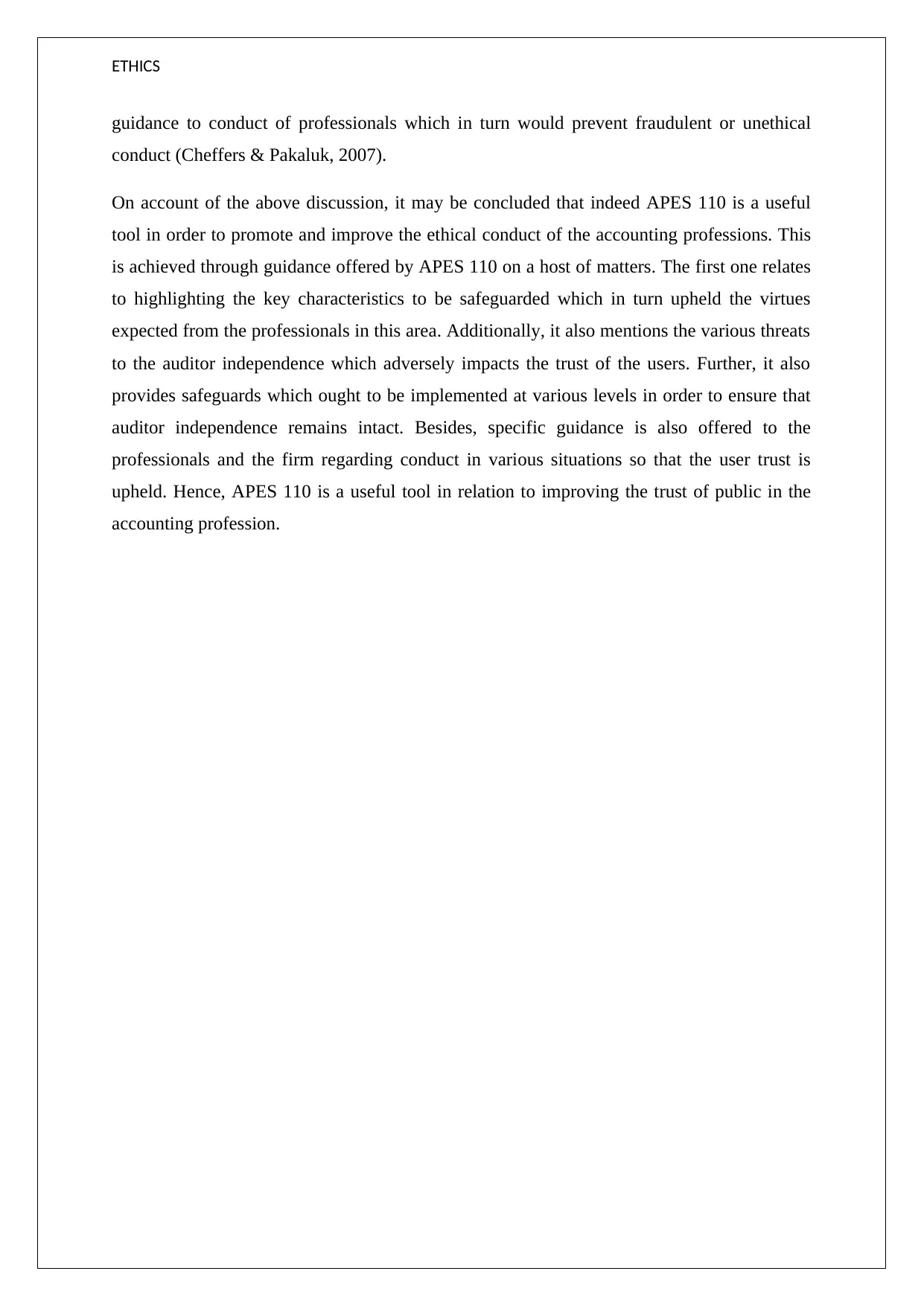
ETHICS
guidance to conduct of professionals which in turn would prevent fraudulent or unethical
conduct (Cheffers & Pakaluk, 2007).
On account of the above discussion, it may be concluded that indeed APES 110 is a useful
tool in order to promote and improve the ethical conduct of the accounting professions. This
is achieved through guidance offered by APES 110 on a host of matters. The first one relates
to highlighting the key characteristics to be safeguarded which in turn upheld the virtues
expected from the professionals in this area. Additionally, it also mentions the various threats
to the auditor independence which adversely impacts the trust of the users. Further, it also
provides safeguards which ought to be implemented at various levels in order to ensure that
auditor independence remains intact. Besides, specific guidance is also offered to the
professionals and the firm regarding conduct in various situations so that the user trust is
upheld. Hence, APES 110 is a useful tool in relation to improving the trust of public in the
accounting profession.
guidance to conduct of professionals which in turn would prevent fraudulent or unethical
conduct (Cheffers & Pakaluk, 2007).
On account of the above discussion, it may be concluded that indeed APES 110 is a useful
tool in order to promote and improve the ethical conduct of the accounting professions. This
is achieved through guidance offered by APES 110 on a host of matters. The first one relates
to highlighting the key characteristics to be safeguarded which in turn upheld the virtues
expected from the professionals in this area. Additionally, it also mentions the various threats
to the auditor independence which adversely impacts the trust of the users. Further, it also
provides safeguards which ought to be implemented at various levels in order to ensure that
auditor independence remains intact. Besides, specific guidance is also offered to the
professionals and the firm regarding conduct in various situations so that the user trust is
upheld. Hence, APES 110 is a useful tool in relation to improving the trust of public in the
accounting profession.
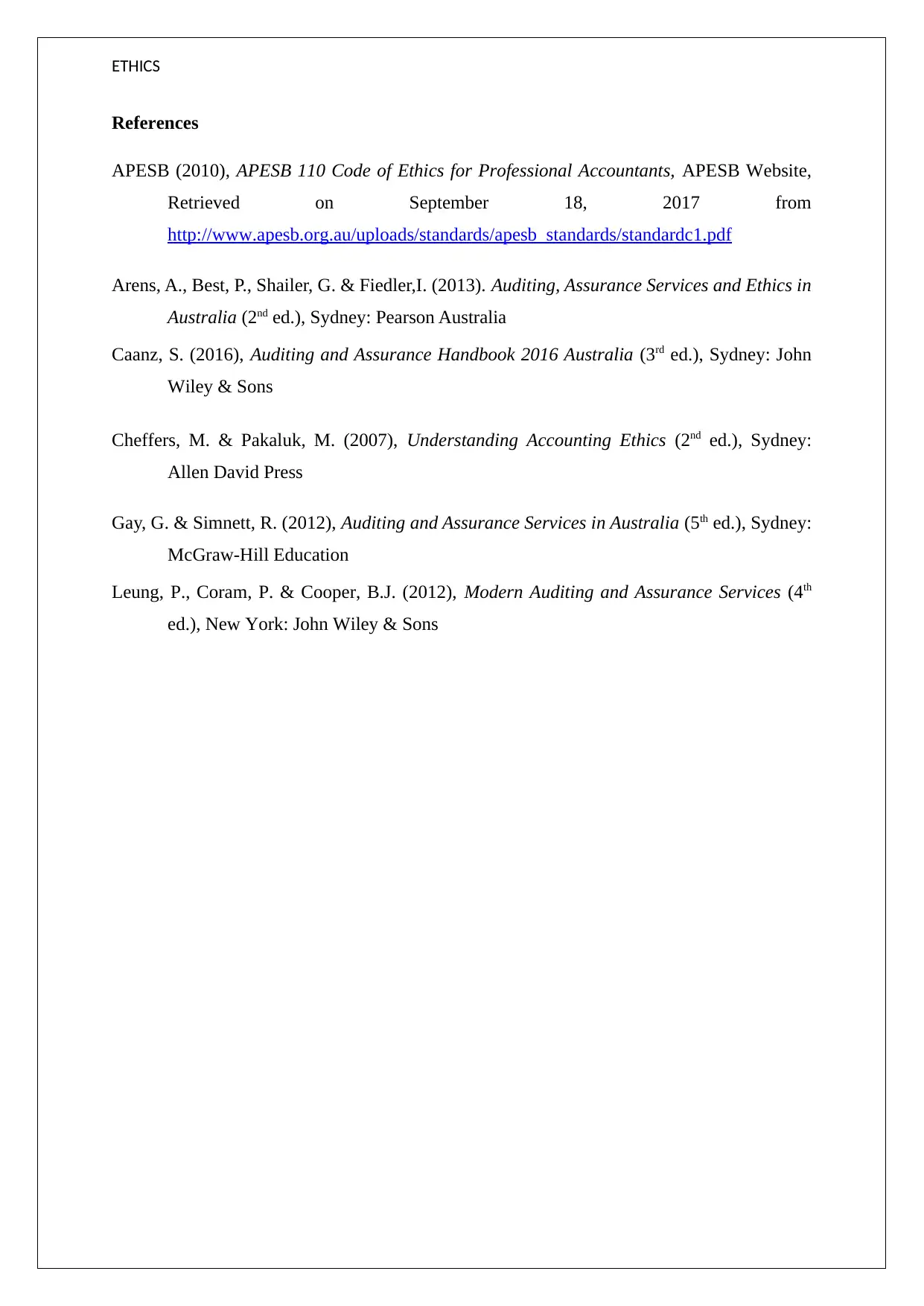
ETHICS
References
APESB (2010), APESB 110 Code of Ethics for Professional Accountants, APESB Website,
Retrieved on September 18, 2017 from
http://www.apesb.org.au/uploads/standards/apesb_standards/standardc1.pdf
Arens, A., Best, P., Shailer, G. & Fiedler,I. (2013). Auditing, Assurance Services and Ethics in
Australia (2nd ed.), Sydney: Pearson Australia
Caanz, S. (2016), Auditing and Assurance Handbook 2016 Australia (3rd ed.), Sydney: John
Wiley & Sons
Cheffers, M. & Pakaluk, M. (2007), Understanding Accounting Ethics (2nd ed.), Sydney:
Allen David Press
Gay, G. & Simnett, R. (2012), Auditing and Assurance Services in Australia (5th ed.), Sydney:
McGraw-Hill Education
Leung, P., Coram, P. & Cooper, B.J. (2012), Modern Auditing and Assurance Services (4th
ed.), New York: John Wiley & Sons
References
APESB (2010), APESB 110 Code of Ethics for Professional Accountants, APESB Website,
Retrieved on September 18, 2017 from
http://www.apesb.org.au/uploads/standards/apesb_standards/standardc1.pdf
Arens, A., Best, P., Shailer, G. & Fiedler,I. (2013). Auditing, Assurance Services and Ethics in
Australia (2nd ed.), Sydney: Pearson Australia
Caanz, S. (2016), Auditing and Assurance Handbook 2016 Australia (3rd ed.), Sydney: John
Wiley & Sons
Cheffers, M. & Pakaluk, M. (2007), Understanding Accounting Ethics (2nd ed.), Sydney:
Allen David Press
Gay, G. & Simnett, R. (2012), Auditing and Assurance Services in Australia (5th ed.), Sydney:
McGraw-Hill Education
Leung, P., Coram, P. & Cooper, B.J. (2012), Modern Auditing and Assurance Services (4th
ed.), New York: John Wiley & Sons
⊘ This is a preview!⊘
Do you want full access?
Subscribe today to unlock all pages.

Trusted by 1+ million students worldwide
1 out of 6
Related Documents
Your All-in-One AI-Powered Toolkit for Academic Success.
+13062052269
info@desklib.com
Available 24*7 on WhatsApp / Email
![[object Object]](/_next/static/media/star-bottom.7253800d.svg)
Unlock your academic potential
Copyright © 2020–2026 A2Z Services. All Rights Reserved. Developed and managed by ZUCOL.




